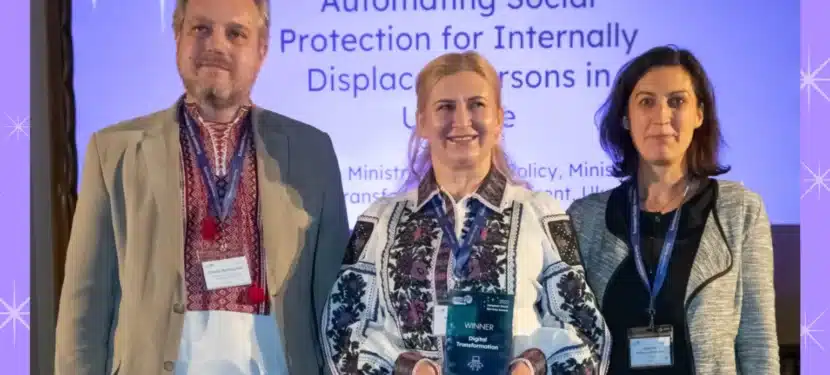Digital Transformation Winner: Automating Social Protection for Internally Displaced Persons in Ukraine
Due to the Russian invasion of Ukraine, the Ukrainian Ministry of Social Policy has a pressing challenge to provide social protection and benefits to many internally displaced persons. To tackle this problem, a new platform was developed which centralises appointments and payment processes, supporting almost 2.5 million internally displaced people, enabling the government to monitor their social protection efforts.
Discover the transformative journey of the Ukrainian Ministry of Social Policy and Ministry of Digital Transformation & Medirent, as they share their remarkable story of innovation and community impact through their award-winning project, Automating Social Protection for Internally Displaced Persons in Ukraine.
What does winning an European Social Services Award mean for your organisation? How do you feel about this recognition and experience?
Winning the European Social Services Award is a significant recognition of our collective efforts and dedication towards providing person-centred care. It provides us with validation that our innovative and strategic approach to integrating technology and digitization in social services is effective. This distinction not only bolsters our drive to continue improving our services but also highlights the international acknowledgment of our contribution to assisting internally displaced persons, which is crucial for our mission.
Why did you choose to apply for the 2022 European Social Services Awards?
Our decision to apply for the 2023 European Social Services Awards is motivated by the opportunity it provides. This not only allows us to demonstrate the success of our initiatives but also positions us to play a significant role in shaping and improving social services across Europe.
What is the added value of being part of a European Network for your organisation? Why is it important to share practice and projects with other actors across Europe?
It fosters collaboration and the exchange of ideas, enabling us to learn from diverse practices and projects across Europe. This sharing of experiences enhances our own strategies and approaches, ensuring a more comprehensive understanding of effective social services. The collaborative environment within the network promotes innovation, allows us to stay informed about best practices, and ultimately strengthens our ability to address the complex challenges faced by individuals and communities.
How does your winning project support person-centred care?
Our project, by automating social protection for internally displaced persons, has been instrumental in delivering person-centred care. By centralizing appointments, accrual, and payment processes using the Unified Information System of the Social Sphere (UISSS), we have been able to ensure that the needs of each individual are met efficiently and effectively. The automation has not only reduced the workload of social workers but also enabled us to personalize our care to suit each individual’s unique circumstances. We have been able to reach and assist nearly 2.5 million internally displaced persons, empowering them and enhancing their independence within their communities. Furthermore, the use of digital tools has allowed us to closely monitor and analyze our efforts, which helps us continuously improve our services.
What were the key reasons for the success of your project?
The project “Automation of Social Protection for Internally Displaced Persons in Ukraine” is a vivid confirmation of how effective collaboration between different structures and public-private partnerships enables addressing complex social issues in extreme conditions. It underscores the importance of digital technologies in efficient management of social processes.
Why should an organisation enter the Awards in 2024?
Organisations should participate in the 2024 awards because it provides a platform to showcase their initiatives, exchange knowledge, and learn from other innovative practices. The awards highlight the remarkable work being done in the field of social services, which can inspire and motivate others to strive for excellence. Furthermore, it’s a valuable opportunity for organizations to gain recognition for their hard work and commitment to improving their services and making a tangible difference in their communities.








